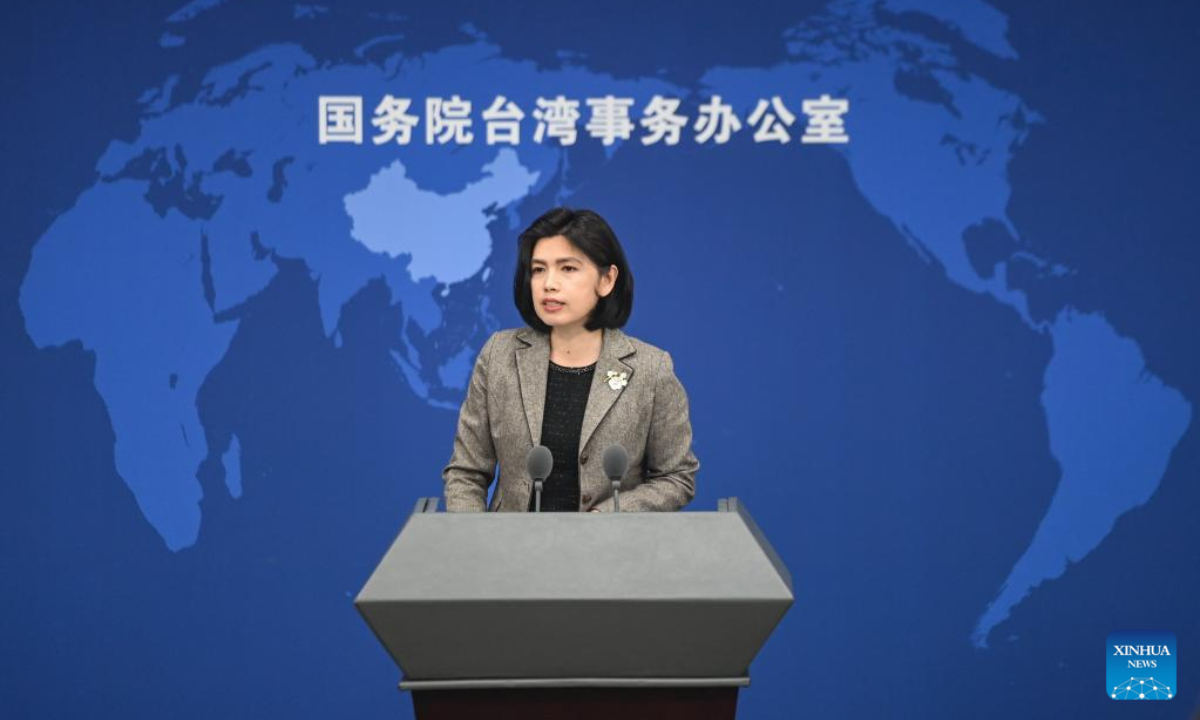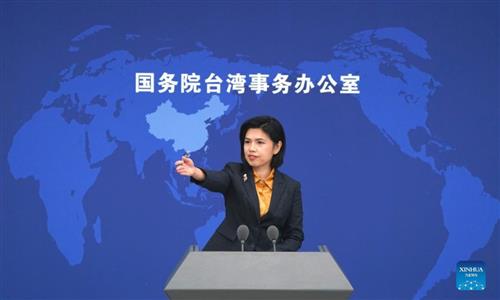
Zhu Fenglian, spokesperson for the Taiwan Affairs Office of the State Council, speaks at a press conference in Beijing, capital of China, March 29, 2023. Photo:Xinhua
The island of Taiwan's "mainland affairs council" recently released a "plan" to "resume" cross-Straits tourism and exchanges, but such a plan is a "pie in the sky" as it actually imposes stricter restrictions for exchanges, Zhu Fenglian, spokesperson for the Taiwan Affairs Office of the State Council, said on Friday.
Taiwan's "mainland affairs council" announced on Thursday that it will "loosen restrictions" on business travelers from the Chinese mainland. Tour groups from the mainland are allowed to visit the island but with a maximum of 2,000 people per day. The resumption of group tours will begin in a month but no specific date was given, according to media on the island.
Zhu depicted the "plan" to "resume" cross-Straits exchanges as "a pie in the sky" created by the Democratic Progressive Party (DPP) authorities, as it claims to "resume" but actually refuses to lift the ban, and claims to "relax" but actually imposes stricter restrictions on cross-Strait exchanges.
The spokesperson noted that the DPP's so-called plan has set three ignominious records in the history of cross-Strait exchanges, as it imposes unprecedented restrictions on people from the island of Taiwan traveling to the mainland in group tours, unprecedented regulation of Taiwan's tourism industry, and unprecedented restrictions on companies on the island to invite mainland personnel to Taiwan for exhibitions and business exchanges.
Zhu said that the Chinese mainland has always opened its doors and warmly welcomed compatriots from the island of Taiwan to travel to the mainland without any limits on the number of people. It is absurd that the DPP now wants to control the number of cross-Straits tourists based on the so-called "principle of reciprocity" and require Taiwan's tourism associations to establish a mechanism to regulate the number of tourists to the mainland.
"People can't help but ask, since the lifting of martial law in Taiwan in 1987, people on the island have never encountered any obstacles when traveling to the mainland. Why are the DPP authorities so afraid of people coming to the mainland? Do they want to bring Taiwan back to the state of martial law?" said Zhu, noting that the DPP authorities are trying in vain to use the so-called "principle of reciprocity" as an excuse to shift blame and responsibility.
The DPP's "plan" precisely regulates the exhibition booth area for companies on the island of Taiwan, and restricts the length of stay for mainland personnel in the island to one day. It also sets different quotas for invitation restrictions. The strictness and meticulousness of the restrictions on companies in the island and mainland personnel going to the island Taiwan are astonishing, said Zhu.
The so-called plan is clearly a barrier disguised as "relaxation," said Zhu, noting that the DPP authorities have spared no effort to come up with absurd and unpopular measures to obstruct and restrict normal cross-Straits exchanges.
The desire for communication, cooperation, peace, and development is the common aspiration of the people on the island of Taiwan. The DPP authorities are trying to deceive and cover up their true intentions of obstructing exchanges and interactions between the island and the mainland with their so-called "plan," said Zhu.
We believe that compatriots in the island can see through their intentions and will not be deceived. We hope that compatriots on both sides can work together to promote the return of cross-Straits relations to the correct track of peaceful development and truly achieve the normalization and regularity of cross-Strait tourism and two-way exchanges, said Zhu.
Global Times

